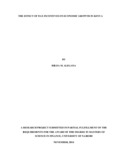| dc.description.abstract | Taxation is the key source of revenue that the government of Kenya uses to provide public
goods and services to its citizenry. Over the last decade, though revenue collections have
increased, the revenues collected have not been sufficient to fund the budget proposals
resulting into budget deficits. Raising adequate tax revenues remains a key objective of
Kenya’s tax system and therefore, the government must strike a balance between the ever
increasing competing development needs and the desire to encourage investments through
tax incentives. The budget deficit of a government is a form of a negative saving and a
reduction in the deficit can positively influence the net national savings more than any
feasible changes in tax policies and encourage savings within an economy which will then
stimulate investments. It is therefore important for the government to raise adequate revenue
through taxation in order to meet its development agenda.
The objective of the study was to establish the effect of tax incentives on economic growth
in Kenya. To achieve this secondary data was used and it was analyzed using descriptive
analysis, correlation analysis and regression analysis. The findings showed that there was an
inverse relationship between GDP growth rate and tax incentives and GDP growth rate and
the stage of development while there was a positive relationship between GDP growth rate
and investment levels, GDP growth rate and productive population levels and GDP growth
rate and literacy levels. It was further found that the relationship between the GDP growth
rate and global competitiveness index, GDP growth rate and level of investments, GDP
growth rate and percentage of productive population and GDP growth rate and literacy levels
was not statistically significant.
It was concluded that rationalization of the current tax incentive schemes is necessary to
ensure that the government is able to enhance collection of revenues to enable it fund the
ever increasing budgetary plans and fund its development plans to spur economic growth in
the country. The tax incentive schemes in the available must be seen to be beneficial to the
economy or support economic growth of the country and as such Kenya should not focus on
giving up so as tax expenditures but should focus on optimal tax policies and measures that
enhance economic growth. | en_US |

